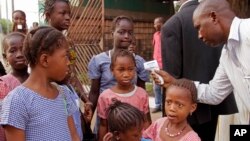In Guinea, the government is trying to stem growing panic over false rumors that the Red Cross will begin administering an Ebola vaccine to schoolchildren, which has led some parents to take their children out of school and angry youth to attack health workers.
The Guinean government said there are no plans for the Red Cross or anyone else to launch an Ebola vaccination campaign in schools.
Health Minister Colonel Remy Lamah told VOA the rumors were “baseless” and were started by people who wanted to sabotage the fight against Ebola.
Lamah said the Red Cross would not be able to embark on a vaccination campaign on its own without the cooperation of the Health Ministry.
He also said any such campaign would also be preceded by a large education and awareness campaign, because people were worried that they could catch Ebola through a vaccination.
Man accused of spreading rumor
State television Saturday night showed a man accused by authorities of spreading the false rumor. Police said the man would soon appear before a judge.
The vaccination rumor has spread like wildfire in the past week. Parents scrambled to collect their children from schools around the country.
Schools in Kindia and Boke -- large cities in the west of the country -- were shut Wednesday and Thursday because of threats from students and parents.
On Friday in Faranah in Upper Guinea, angry students attacked and destroyed a transit center for Ebola patients and set fire to a vehicle belonging to Doctors Without Borders. Two of its workers narrowly escaped lynching by the angry students.
Health Minister Lamah said the government was involving parents in an awareness campaign it has launched in schools to refute the rumor.
He added the government is working hard to keep students safe from Ebola, by telling students they must wash their hands before classes, and outside food sellers and foreign visitors have been banned from school grounds.
Lamah said, at present, students are more protected in schools than on the streets or in their homes.
Health care workers
The Red Cross said members of its staff in Guinea, where this regional epidemic began more than a year ago, are being attacked on average 10 times per month.
Health authorities have reported as much as a three-fold increase in infection rates since January, which they blame on people refusing to cooperate with contact tracing.
The government said it was still working to eradicate Ebola by the end of February, the goal it set at the start of the year.




